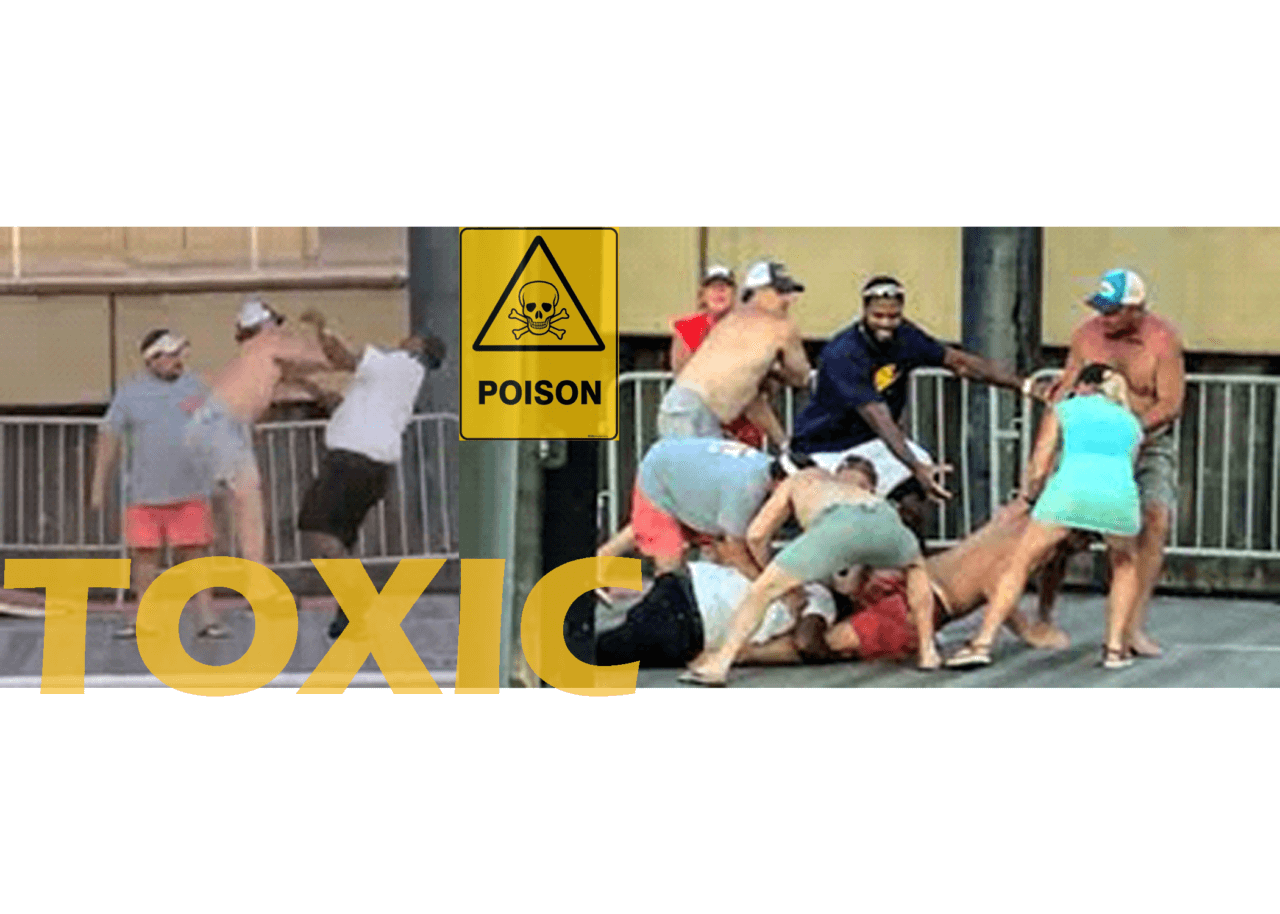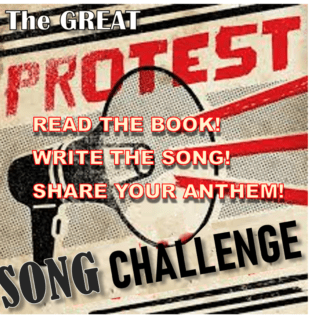TOXIC

TOXIC
By K. Snyder
As reported by the AP; Police say additional charges are likely as they investigate a large, chaotic caught-on-video brawl at a riverfront dock in Montgomery, Alabama, on Saturday that has so far resulted in arrest warrants for three men. The incident began as a dispute over a dockside parking spot at Riverfront Park that led to the co-captain of a riverboat being attacked by a group that had parked their pontoon in the riverboat’s spot, Montgomery Police Chief Darryl J. Albert said Tuesday.
It then escalated into a large fight that involved punches, a chair to the head and at least one person in the water. Arrest warrants were issued Tuesday for three men, all of them from the private pontoon boat, Albert said at a news conference. Richard Roberts, 48, was charged with two counts of third-degree assault, while Allen Todd, 23, and Zachary Shipman, 25, were each charged with one such count, Albert said. The chief described the three as White men.
The incident in Montgomery, Alabama, underscores the pervasiveness of toxic whiteness and the destructive consequences it can have. A dispute over a simple parking spot escalated into a chaotic brawl, reflecting an imbalanced sense of entitlement and aggression. The behavior displayed by the individuals involved, who were described as white men, highlights the impact of toxic whiteness and the readiness to resort to violence over trivial matters. This incident serves as a stark reminder that addressing these issues and promoting a culture of empathy, understanding, and respect is crucial in fostering a more harmonious society.
The lack of respect shown to the Black co-captain of the riverboat in this incident is a stark example of the deeply ingrained nature of systemic racism that persists in our society. Despite holding a position of authority as a uniformed co-captain, the white individuals involved in the altercation chose to disregard his authority and instead resorted to hostility, racial slurs, and violence.
This reflects a broader pattern of disregard for the authority and humanity of Black people, stemming from toxic whiteness and a sense of entitlement that some may feel overrules the rights and positions of others. This incident underscores the urgent need for addressing and dismantling systemic racism to create a more just and equitable society where every person is treated with dignity and respect, regardless of their race or position.
The actions of the Black passengers who courageously intervened to defend the Black co-captain reflect a powerful sense of solidarity and resistance against racial injustice. This demonstrates the resilience and determination of today’s Black Americans to stand up against inequality and protect one another in the face of adversity. Their intervention underscores the ongoing fight for racial equality and the rejection of complacency in the face of discrimination. It’s a testament to the strength of community and a refusal to tolerate acts of violence and racism.
Looking to the future, this incident suggests a growing awareness and unity among African Americans in addressing racial injustices. It signifies a generation that is not willing to accept mistreatment and is willing to take action to create a more just and equitable society. The actions of these persons provide hope for a future where solidarity, justice, and equality prevail, ultimately shaping a more inclusive and compassionate nation. Â
The term “toxic” is used to describe a harmful or damaging quality that negatively impacts individuals or society. In the context of the Montgomery brawl, where a group of white individuals engaged in a physical altercation and showed blatant disregard for authority and empathy, the term “toxic” can be seen as accurate. The behavior exhibited by the pleasure boaters resulted in violence, disruption, and a lack of respect for others’ rights and well-being. It signifies a harmful dynamic that contributes to social tensions and division.
To those who dismiss the concept of toxic whiteness as non-existent overlooks a history marred by instances like the Ahmaud Arbery murder, the racially motivated Bensonhurst pizza parlor murder, the devastating Tulsa Race Massacre, and the deadly and heartbreaking Birmingham church bombing. These events, along with countless others, reveal a pattern of systemic racism and prejudice that cannot be ignored or “whitewashed†into history as governors in Florida and Texas are attempting to do in their state’s public schools today.
To be sure, toxic whiteness doesn’t imply that every white individual embodies it, but rather points to the deeply rooted societal norms and structures that perpetuate racial inequalities. It’s a call to confront the historical and present-day biases that have privileged one group while marginalizing others. Â By understanding and acknowledging toxic whiteness, we open the door to meaningful discussions about dismantling these harmful systems and fostering a society where everyone can thrive. It’s a vital step towards healing the wounds of the past and creating a more equitable future for all.
In 2023, this incident serves as a reminder that despite societal progress, deep-rooted racial tensions and inequalities continue to persist in the United States. The fact that a Black co-captain could be disrespected, attacked, and beaten by a group of whites, simply for doing his job, reflects a troubling undercurrent of racism that remains unresolved.
It underscores the reality that while strides have been made in addressing systemic racism, there is still much work to be done to achieve true racial equality and harmony. Furthermore, it highlights the volatile political climate of the country. It suggests that divisive rhetoric and ideologies may still have a foothold, leading to confrontations and incidents of violence fueled by racial and political animosity. The willingness of some individuals to resort to physical altercations over a non –dispute also speaks to a broader culture of intolerance and a lack of constructive dialogue and conflict resolution skills.
Overall, the melee serves as a poignant example that despite the passage of time, the nation’s struggle with racism and its political divisions are ongoing challenges that require continued effort and commitment to address effectively.
The occurrence of a suspicious fire at a Black church in Durham, NC, over the same weekend as the riverboat brawl is deeply concerning. This unfortunate incident highlights the ongoing challenges and threats that marginalized communities, particularly Black communities, continue to face.
The suspicious nature of the fire underscores the need for vigilant efforts to combat acts of hate and prejudice that target places of worship and community gathering spaces. It also emphasizes the importance of addressing and confronting systemic issues that contribute to such incidents, including racial tension and intolerance. The events together underscore the continued relevance of discussions on social justice, equity, and the need for a more inclusive and harmonious society.




